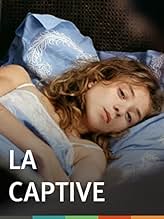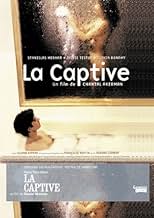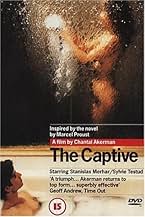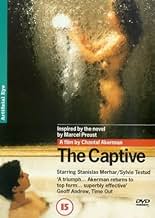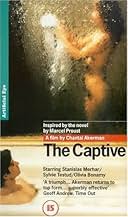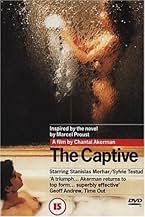AVALIAÇÃO DA IMDb
6,0/10
2,3 mil
SUA AVALIAÇÃO
Adicionar um enredo no seu idiomaAn adaptation of Proust's "La Prisoniere" (book five of "Remembrance of Things Past"). Set in Paris, France, it is a serious tale of a tragic and dysfunctional love.An adaptation of Proust's "La Prisoniere" (book five of "Remembrance of Things Past"). Set in Paris, France, it is a serious tale of a tragic and dysfunctional love.An adaptation of Proust's "La Prisoniere" (book five of "Remembrance of Things Past"). Set in Paris, France, it is a serious tale of a tragic and dysfunctional love.
- Direção
- Roteiristas
- Artistas
- Prêmios
- 3 indicações no total
- Direção
- Roteiristas
- Elenco e equipe completos
- Produção, bilheteria e muito mais no IMDbPro
Avaliações em destaque
This is a subtly faithful interpretation of Proust's The Prisoner in which Chantal Akerman makes chasers and voyeurs out of her viewers, craning to see around street corners, straining to make out desired shapes behind warped glass. While the camera pursues the truth about Ariane, who seems to be forever drifting away, we remain fixed in the claustrophobic world of Simon's preoccupied anxiety. As did Proust, Akerman opens a space for the exploration of co-dependent attachment, not only love, and the painful reality of the search for self- avoidance. The Prisoner leaves the viewer caught between the (apparent) bliss of Ariane's ignorance and Simon's monomaniacal certainty. For me, this is the closest French cinema has come (up to now) to bottling the elusive Albertine scent. The silent film reel that plays during the film's opening too recalls the playful beaches of Balbec In the Shadow of Young Girls in Flower, foreshadowing undoing and tragedy. A film for anyone who understands obsession.
This film gets only 5.9?! First, I love Proust, but you do not have to read this specific part of 'In Search of Lost Time' to appreciate this extraordinary story of obsession and the need of one lover to absorb another, and the other lover to need to keep both a distance and a mystery in the relationship.
Chantal Akerman was arguably one of France's greatest directors before she was tragically lost. She was focused in a way that makes most directors seem fuzzy, and her talent with both images and actors was unbeatable. That her images and pacing take their time demands attention from an audience like any work of art. She uses Rachmaninov's music 'Isle of the Dead' as a key motif in sound that puts other overlaid music in most films to shame. I am here to praise this film, but her work as a whole deserves perhaps more praise than it gets. Eric De Kuyper, a great writer who wrote the script with her, is also a filmmaker of importance. Eric De Kuyper, a great writer who wrote the script with her, is also a filmmaker of importance. Everything is in order in this film. Both lead actors are superb, especially Stanislas Merhar who is, in my opinion, a male Garbo among actors. Elusive, beautiful and always holding an essential mystery in his way of acting, he rivets the gaze of the viewer to the screen. There is nothing to fault in this film, and impatient viewers, which most reviewers are, should watch it more than once. It deserves more than the insulting 5.9 it has been given, but then this perhaps reflects the quality of the eyes and minds that receive it.
Chantal Akerman was arguably one of France's greatest directors before she was tragically lost. She was focused in a way that makes most directors seem fuzzy, and her talent with both images and actors was unbeatable. That her images and pacing take their time demands attention from an audience like any work of art. She uses Rachmaninov's music 'Isle of the Dead' as a key motif in sound that puts other overlaid music in most films to shame. I am here to praise this film, but her work as a whole deserves perhaps more praise than it gets. Eric De Kuyper, a great writer who wrote the script with her, is also a filmmaker of importance. Eric De Kuyper, a great writer who wrote the script with her, is also a filmmaker of importance. Everything is in order in this film. Both lead actors are superb, especially Stanislas Merhar who is, in my opinion, a male Garbo among actors. Elusive, beautiful and always holding an essential mystery in his way of acting, he rivets the gaze of the viewer to the screen. There is nothing to fault in this film, and impatient viewers, which most reviewers are, should watch it more than once. It deserves more than the insulting 5.9 it has been given, but then this perhaps reflects the quality of the eyes and minds that receive it.
Having recently discovered French actress Sylvie Testud when I saw The Chateau, I was interested in this film because she's in it. I haven't read the story that the film is supposedly based on so I had nothing to compare it to when I saw it and therefore I went in without any preconceived notions. And with a film like this, a film that doesn't operate on any conventional filmmaking level, that is a very good thing.
This movie doesn't try to tell you what to think or feel about its characters; there is none of the contrivances so common in American movies, none of the manipulation. It just simply presents them and follows them and allows them to do what they do without the camera cutting away too soon for fear that the audience will get bored when there's not a lot "going on" in a scene - in fact some of the best scenes in the film have hardly any movement at all. And this is not done in a self-conscious, 'arty' let's-create-mood sort of way, which makes watching it - or rather experiencing it - even more hypnotic.
This is a film that must be experienced more than once, I would say: you're not really sure what's transpired OR how you feel about what you've witnessed upon a first viewing because it doesn't hit all the 'buttons' that a commercial film is compelled to hit. And Testud is brilliant, managing to imply complexity without demonstrating it (if that makes sense) - she's beyond subtle, beyond sublime.
This movie doesn't try to tell you what to think or feel about its characters; there is none of the contrivances so common in American movies, none of the manipulation. It just simply presents them and follows them and allows them to do what they do without the camera cutting away too soon for fear that the audience will get bored when there's not a lot "going on" in a scene - in fact some of the best scenes in the film have hardly any movement at all. And this is not done in a self-conscious, 'arty' let's-create-mood sort of way, which makes watching it - or rather experiencing it - even more hypnotic.
This is a film that must be experienced more than once, I would say: you're not really sure what's transpired OR how you feel about what you've witnessed upon a first viewing because it doesn't hit all the 'buttons' that a commercial film is compelled to hit. And Testud is brilliant, managing to imply complexity without demonstrating it (if that makes sense) - she's beyond subtle, beyond sublime.
Because of its complex and introspective nature, the works of the great French novelist Marcel Proust have been difficult to translate to the screen in spite of some very fine attempts by Raul Ruiz and others. Chantal Akerman's La Captive is no exception. Inspired by the fifth of seven volumes of Proust's epic novel In Search of Lost Time, the film captures the obsessive quality of the relationship between Simon (Stanislaus Merhar) and Ariane (Sylvie Testud) (Marcel and Albertine in the novel), but is unable to project onto the screen the novel's exquisite prose, psychological subtlety, or depth of feeling. While Simon is given a thoughtful treatment, he comes across more as strange and unpleasant than the deeply sensitive, poetic young man of the book.
La Captive begins at home with Simon viewing films of Ariane and some friends during their summer together in Normandy. Repeatedly viewing the footage, he carefully utters the words "I really like you," but it is unclear if the sentiment is his, or if he is vocalizing what he imagines to be the thoughts of his mistress. Set in Paris, Akerman updates the story from its turn of the century milieu and transports it to the modern era with automobiles and well-lit boulevards filled with traffic replacing the horse and carriage. Simon is a somber, well-to-do young man who lives in an ornate Paris apartment with his grandmother (Francoise Bertin), housekeeper Francoise (Liliane Rovére), and girlfriend Ariane (Sylvie Testud).
Though they claim to love each other, each keeps their distance. Ariane lives in an adjacent room and only comes to see Simon when he sends for her in an ongoing ritual. Dialogue is sparse and mostly consists of Simon asking Ariane questions that elicit noncommittal responses such as "if you like," "I can't say," or "you think so?" Mimicking Bressonian models, the actor's facial expressions range from enigmatic to blank, and, aside from some perfunctory kissing, the only time that passion shows up is when Simon rubs up against Ariane's body while she is asleep (or pretending to be). When Simon demands to know what Ariane is thinking, she replies, "If I had any thoughts, I'd tell you—but I don't." Some situations would be comical if they were not sad. As Simon watches Ariane from an adjoining bathroom while sitting in his tub, he tells her how much he admires the odors between her legs and says that if it weren't for his illnesses, he would rather that she would never wash. On another occasion, he probes to find out the number of lies she has told him, insisting that two lies are not enough, he wants at least four. The jealous and insecure Simon has accumulated evidence in his own mind that Ariane is physically attracted to women but it is not made clear (either in the novel or the film) whether his suspicions are real or imagined.
Nonetheless, Simon is preoccupied by the part of Ariane's life that he believes she is withholding from him, following her in an art gallery and physically removing her from a performance of Carmen at the Trocadero out of his fear of her friendship with the actress Lea (Aurora Clément). When Simon is unable to leave the house because of an asthmatic condition, he assigns their mutual friend Andrée (Olivia Bonamy) to track her whereabouts and report back to him. He even goes so far as to question lovers Sarah (Bérénice Bejo) and Isabelle (Anna Mouglalis) about what they think about when they make love.
Although the characterizations in La Captive are very real and quite haunting, the film covers only a small portion of Proust's fifth volume, omitting the colorful characters that make it so special: Charlus, Morel, the Verdurin's, Brichot, and Mme de Guermantes to name a few, and there is no hint of the music, society, and themes of memory, nature, and awareness of time and place that dominate the narrative. Though the pacing is deliberately slow to capture the enigmatic quality of the relationship, the film, while absorbing, is static and does not draw us deeply enough into its mysteries to compensate for its dramatic inertness.
La Captive begins at home with Simon viewing films of Ariane and some friends during their summer together in Normandy. Repeatedly viewing the footage, he carefully utters the words "I really like you," but it is unclear if the sentiment is his, or if he is vocalizing what he imagines to be the thoughts of his mistress. Set in Paris, Akerman updates the story from its turn of the century milieu and transports it to the modern era with automobiles and well-lit boulevards filled with traffic replacing the horse and carriage. Simon is a somber, well-to-do young man who lives in an ornate Paris apartment with his grandmother (Francoise Bertin), housekeeper Francoise (Liliane Rovére), and girlfriend Ariane (Sylvie Testud).
Though they claim to love each other, each keeps their distance. Ariane lives in an adjacent room and only comes to see Simon when he sends for her in an ongoing ritual. Dialogue is sparse and mostly consists of Simon asking Ariane questions that elicit noncommittal responses such as "if you like," "I can't say," or "you think so?" Mimicking Bressonian models, the actor's facial expressions range from enigmatic to blank, and, aside from some perfunctory kissing, the only time that passion shows up is when Simon rubs up against Ariane's body while she is asleep (or pretending to be). When Simon demands to know what Ariane is thinking, she replies, "If I had any thoughts, I'd tell you—but I don't." Some situations would be comical if they were not sad. As Simon watches Ariane from an adjoining bathroom while sitting in his tub, he tells her how much he admires the odors between her legs and says that if it weren't for his illnesses, he would rather that she would never wash. On another occasion, he probes to find out the number of lies she has told him, insisting that two lies are not enough, he wants at least four. The jealous and insecure Simon has accumulated evidence in his own mind that Ariane is physically attracted to women but it is not made clear (either in the novel or the film) whether his suspicions are real or imagined.
Nonetheless, Simon is preoccupied by the part of Ariane's life that he believes she is withholding from him, following her in an art gallery and physically removing her from a performance of Carmen at the Trocadero out of his fear of her friendship with the actress Lea (Aurora Clément). When Simon is unable to leave the house because of an asthmatic condition, he assigns their mutual friend Andrée (Olivia Bonamy) to track her whereabouts and report back to him. He even goes so far as to question lovers Sarah (Bérénice Bejo) and Isabelle (Anna Mouglalis) about what they think about when they make love.
Although the characterizations in La Captive are very real and quite haunting, the film covers only a small portion of Proust's fifth volume, omitting the colorful characters that make it so special: Charlus, Morel, the Verdurin's, Brichot, and Mme de Guermantes to name a few, and there is no hint of the music, society, and themes of memory, nature, and awareness of time and place that dominate the narrative. Though the pacing is deliberately slow to capture the enigmatic quality of the relationship, the film, while absorbing, is static and does not draw us deeply enough into its mysteries to compensate for its dramatic inertness.
Modern day adaptation of a section of Proust's magnum opus that is true enough to the book in its theme and events and interestingly has the Marcel character still sunk in an archaic, aristocratic world.
KD Lang lookalike Stanislas Merhar does a good job doing the insulated, emotional (and physical) frailty, trapped in an adolescent infatuation of towering poetic naivety, all the while consumed with jealousy by the suspicion that his live-in girlfriend is an active lesbian behind his back.
It's slow. There's a lot of prowling around his creaking Paris apartment, lots of talking in cars - we seem to be taking entire journeys in real time. Akerman gave herself an easy directing job. The use of classical music is lazy - Schubert's Arpeggione Sonata is suitably Proustian, but Rachmaninov's Isle of the Dead is absurdly melodramatic, especially when played incongruously, Godard-fashion, over serene images.
Those familiar with the writer and director can easily pull back the gauze to reveal the real issues - an inverted couple struggling to maintain a hetero relationship - but that is so superficial it hardly seems worth special effort and the film works better with the ambiguity in place (as intended), with the implication that naivety (misunderstanding, confusion) is at the root of jealous passion. The Marcel character is so naïve that in the sex scenes he doesn't even know that he is supposed to put it in - doing the movements without getting undressed (he's in bed in his overcoat in one scene). That was strangely tragic, and although it may have been a stylisation to symbolise their failure to connect, it was easier to take it literally.
With liberties like that though, and done so earnestly, it's craves some indulgence. The worst problem is that the girl is comatose and unattractive, showing nothing of Albertine's sprightliness and guile that gave that character her painful duplicity. The ending too is a disappointment.
KD Lang lookalike Stanislas Merhar does a good job doing the insulated, emotional (and physical) frailty, trapped in an adolescent infatuation of towering poetic naivety, all the while consumed with jealousy by the suspicion that his live-in girlfriend is an active lesbian behind his back.
It's slow. There's a lot of prowling around his creaking Paris apartment, lots of talking in cars - we seem to be taking entire journeys in real time. Akerman gave herself an easy directing job. The use of classical music is lazy - Schubert's Arpeggione Sonata is suitably Proustian, but Rachmaninov's Isle of the Dead is absurdly melodramatic, especially when played incongruously, Godard-fashion, over serene images.
Those familiar with the writer and director can easily pull back the gauze to reveal the real issues - an inverted couple struggling to maintain a hetero relationship - but that is so superficial it hardly seems worth special effort and the film works better with the ambiguity in place (as intended), with the implication that naivety (misunderstanding, confusion) is at the root of jealous passion. The Marcel character is so naïve that in the sex scenes he doesn't even know that he is supposed to put it in - doing the movements without getting undressed (he's in bed in his overcoat in one scene). That was strangely tragic, and although it may have been a stylisation to symbolise their failure to connect, it was easier to take it literally.
With liberties like that though, and done so earnestly, it's craves some indulgence. The worst problem is that the girl is comatose and unattractive, showing nothing of Albertine's sprightliness and guile that gave that character her painful duplicity. The ending too is a disappointment.
Você sabia?
- CuriosidadesChosen by "Les Cahiers du cinéma" (France) as one of the 10 best pictures of 2000 (#02).
- ConexõesFeatured in Women Make Film: A New Road Movie Through Cinema (2018)
- Trilhas sonorasL'ILE DES MORTS, Op 29
Music by Sergei Rachmaninoff
Performed by Koninklijk Concertgebouworkest (as Royal Concertgebouw Orchestra)
Conducted by Vladimir Ashkenazy
© 1909 by HAWKINS & SON (London) LTD
(p) 1984 DECCA RECORDS COMPANY LTD
Avec l'aimable autorisation de UNIVERSAL MUSIC PROJETS SPECIAUX
Principais escolhas
Faça login para avaliar e ver a lista de recomendações personalizadas
- How long is The Captive?Fornecido pela Alexa
Detalhes
- Data de lançamento
- Países de origem
- Idioma
- Também conhecido como
- The Captive
- Locações de filme
- Paris, França(setting of the whole action)
- Empresas de produção
- Consulte mais créditos da empresa na IMDbPro
Bilheteria
- Faturamento bruto mundial
- US$ 636
- Tempo de duração
- 1 h 58 min(118 min)
- Cor
- Mixagem de som
- Proporção
- 1.85 : 1
Contribua para esta página
Sugerir uma alteração ou adicionar conteúdo ausente

